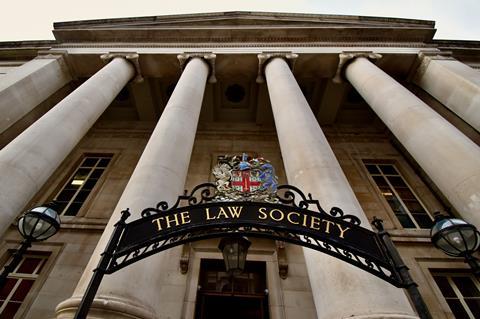This year, the Law Society of England and Wales is celebrating 200 years since its establishment in 1825. In these two centuries of rich and condensed history, the Law Society mirrored the social and economic changes of the country and the globe.
Throughout the 19th century, solicitors played a key role in the urbanisation and industrialisation of the country and were are at the heart of technological developments. Some, like the railway in the 1820s, the telephone in the 1870s and the computers in the 1970s transformed not only the way business is done but our whole lives. Today, AI is ushering a new era of technological transformation with over half of solicitors in firms using some form of AI.
In 1831, the Law Society opened its Chancery Lane building, the same one it is housed today. In this day and age, we may take many things for granted but about 200 years ago, society experienced radical transformation with the expansion of the vote to more men, the abolition of slavery in most British colonies and the end of the death penalty for abortion.
The legal profession and the development of urban economic centres have always been intertwined. In 1837, Newcastle’s Clayton Street was named after one of the city’s clerks, John Clayton, in recognition of his role in the development of the city centre. In the 1850s, solicitor Charles Pearson was first to propose an underground railway in London. In 1863, Arthur Ryland of Birmingham became the first provincial solicitor elected to the Law Society Council.
The Solicitors Act of 1843 is the first formal recognition of the Society’s role and by 1872, the profession numbered nearly 14,000 attracting many politically active social reformers. In 1888, Eliza Orme became the first woman to obtain a law degree in England without, though, being able to qualify as a solicitor. Yet, more change was coming. A few years later, the Married Women Property Act gave married women the right to own property. Former Law Society president Sir Albert Rollit was elected to parliament in 1891 and introduced a private members bill to extend women’s suffrage.
Sir William Bull was an MP and former Law Society president who also supported the women’s suffrage. His personal diaries include letters from several leading suffragettes thanking him for his support.

In 1902, the Law Gazette was first published. Nearly a decade later, the clouds of war were gathering over Europe. A quarter of all solicitors served in the First World War and almost one in ten solicitors and nearly a third of articled clerks were killed or wounded.
Right in the midst of World War One, David Lloyd George became prime minister. He is the first and, so far, only solicitor and Welshman to hold the office. A social reformer, he introduced the state pension and the 1918 Representation of the People Act enabling some women to vote for the first time. The next year, the Sex Disqualification Act gave women the right to enter any profession and so qualify as solicitors.
That same year race riots affected Britain’s major seaports, triggered by the perception that immigrants were taking jobs from returning soldiers. The worst attacks were in Cardiff’s Butetown Docks. The violence prompted leading Cardiff solicitor, Frederick de Courcy Hamilton, who was sympathetic to the area’s ethnic minority community, to write to The Times outlining the problems facing Cardiff’s black community.
The 1920s saw major advancements in women’s rights. In the Bristol Sessions, the first women jurors were allowed to sit in a trial, Carrie Morrison became the first woman admitted as a solicitor and all women over 21 got the vote.
Read more
During the Second World War, more than 7,200 solicitors and 2,253 articled clerks served in the armed forces. This was not the profession’s only contribution to the armed conflict as notably illustrated by Sir Hilary Scott, a former Law Society president, who spent most of the war working for the newly formed Special Operations Executive, which conducted espionage and acts of sabotage in German-occupied Europe.
In the second half of the 20th century, social transformation accelerated, which coupled with globalisation changed the world forever. The Legal Aid and Advice Act of 1949 provided access to justice for many. The first known Black solicitor, Manuel Chandri Delgado, qualified in 1955. The newly formed Council of Europe drafted the European Convention on Human Rights. In the 1960s, the Society of Immigrant Lawyers was founded, now known as the Society of Black Lawyers and in 1977, the Law Society appointed its first female council member, Eirian Evans.
The 1970s also saw the largest firms beginning to open their first international offices and non-British citizens were allowed to practise for the first time in the UK. The fall of the Berlin Wall saw UK firms open offices in Eastern Europe and the 1990 Courts and Legal Services Act allowed multinational partnerships with foreign lawyers.
Today, the UK legal sector exports £9.5 billion a year, over 200 foreign law firms from 40 jurisdictions have offices in London and the City is recognised as a world centre for legal services.
After decades of growth, the 1980s saw the first cuts to legal aid and decades of stagnation and regression followed.
Almost in parallel to global trends reshaping the legal sector, the legal profession followed another movement, that of devolution. In 1967, the Welsh Language Act overturned centuries of law requiring the use of the English language in all courts and in 1998, the Government of Wales Act allowed the devolved government of Wales to pass its own legislation. The Law Society opened its new Cardiff office in 2003. The 2017 Wales Act devolved more powers like health and education.
The dawn of the 21st century consolidates social changes of the previous century with the Civil Partnership Act that gives same sex couples the same legal rights and the 2010 Equality Act. The legal profession echoed those changes. The 2007 Legal Services Act allowed non-solicitors to own law firms and separated the regulatory and representational functions with the establishment of the Solicitors Regulatory Authority. In 2002, the Law Society appointed its first female president Carolyn Kirby, in 2021, the first Black president I. Stephanie Boyce and in 2022, the first Asian and first Muslim president Lubna Shuja.
The Law Society and the legal profession have been at the forefront of the regional, national and international progress of the past two centuries. Law is our way of ratifying social and economic change and solicitors are one of its main defenders.
As the Law Society of England and Wales celebrates its bicentenary, we can look to the past and our rich history to draw inspiration and give us the confidence to deliver further changes in order to create a diverse community and a sustainable future for the next generations.
Richard Atkinson, president of the Law Society of England and Wales































